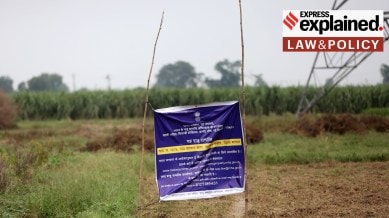Pervez Musharraf’s ancestral land in UP to be auctioned under Enemy Property Act: What it means
Under The Enemy Property Act, the Indian government can take control of certain “enemy property”. Here’s all you need to know.

A parcel of land in Uttar Pradesh, previously belonging to the family of former Pakistan President Pervez Musharraf, is set to be auctioned under The Enemy Property Act.
The Union Home Affairs Ministry said in a notice erected on the plot that around 13 bighas of land in the Kotana Bangar village in Baghpat district has been directed for sale through e-auction until Thursday midnight (September 12).
Under the Act, the Indian government can take control of “enemy property”. Here’s all you need to know.
What is enemy property?
In the wake of the India-Pakistan wars of 1965 and 1971, there was migration of people from India to Pakistan. Under the Defence of India Rules framed under The Defence of India Act, 1962, the Government of India took over the properties and companies of those who took Pakistani nationality.
The Centre vested these “enemy properties” with the Custodian of Enemy Property for India. The same was done for property left behind by those who went to China after the 1962 Sino-Indian War.
The Tashkent Declaration of January 10, 1966, included a clause that said India and Pakistan would discuss the return of the property and assets taken over by either side in connection with the conflict. However, the Government of Pakistan disposed of all such properties in their country in 1971.
How did India deal with enemy property?
The Enemy Property Act, enacted in 1968, provided for the continuous vesting of enemy property in the Custodian of Enemy Property for India. Through the department, the central government owns enemy properties across many states.
Earlier this year, a state government official told The Indian Express there were 24 enemy properties in Karnataka, of which six are in prime spots in Bengaluru worth around Rs 500 crore.
In 2017, Parliament passed The Enemy Property (Amendment and Validation) Bill, 2016, which amended the 1968 Act and The Public Premises (Eviction of Unauthorised Occupants) Act, 1971.
It expanded the definition of the terms “enemy subject”, and “enemy firm” to include the legal heir and successor of an enemy, whether a citizen of India or a citizen of a country which is not an enemy; and the succeeding firm of an enemy firm, irrespective of the nationality of its members or partners.
The amended law provided that enemy property shall continue to vest in the Custodian even if the enemy or enemy subject or enemy firm ceases to be an enemy due to death, extinction, winding up of business or change of nationality, or that the legal heir or successor is a citizen of India or a citizen of a country which is not an enemy.
The Custodian, with prior approval of the central government, may dispose of enemy properties vested in him under the provisions of the Act, and the government may issue directions to the Custodian for this purpose.
Why were these amendments brought?
The amendments aimed to guard against claims of succession or transfer of properties left by people who migrated to Pakistan and China after the wars. The main aim was to negate the effect of a court judgment in this regard.
The statement of objects and reasons in the Bill said: “Of late, there have been various judgments by various courts that have adversely affected the powers of the Custodian and the Government of India as provided under the Enemy Property Act, 1968. In view of such interpretation by various courts, the Custodian is finding it difficult to sustain his actions under the Enemy Property Act, 1968.”
What did these court orders say?
One major judgment was passed in the case of the estate of the erstwhile Raja of Mahmudabad in UP, who owned several large properties in Hazratganj, Sitapur and Nainital.
Following Partition, the Raja left for Pakistan in 1957 and took its citizenship. His wife and son Mohammed Amir Mohammad Khan, however, stayed in India as Indian citizens.
After the 1968 Act, the Raja’s estate was declared enemy property. When he died, his son staked claim to the properties. After a legal battle, an apex court bench comprising Justice Ashok Bhan and Justice Altamas Kabir on October 21, 2005, ruled in his favour.
The verdict opened the floodgates for further pleas in courts in which genuine or purported relatives of persons who had migrated to Pakistan produced deeds of gift claiming they were the rightful owners of enemy properties.
On July 2, 2010, the then-UPA government promulgated an Ordinance that restrained courts from ordering the government to divest enemy properties from the Custodian. The 2005 SC order was thus rendered ineffective, and the Custodian again took over the Raja’s properties. A Bill was introduced in Lok Sabha on July 22, 2010, but it could not be passed during the term of the 15th Lok Sabha and lapsed.
Finally, on January 7, 2016, the President of India promulgated The Enemy Property (Amendment and Validation) Ordinance, 2016, which was replaced by the Bill that became law in 2017.